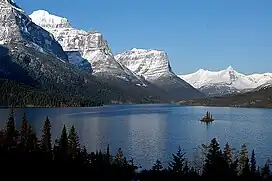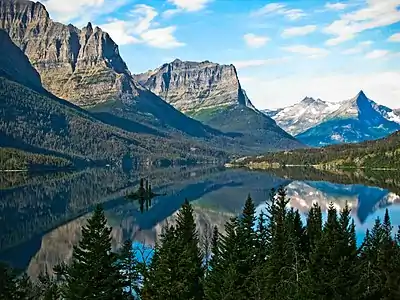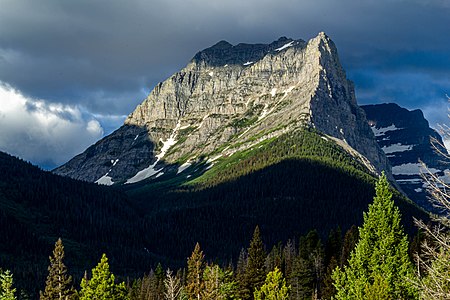| Dusty Star Mountain | |
|---|---|
 Dusty Star Mountain is in center of image, above and slightly left of Wild Goose Island in Saint Mary Lake | |
| Highest point | |
| Elevation | 8,573 ft (2,613 m)[1] |
| Prominence | 573 ft (175 m)[1] |
| Coordinates | 48°39′01″N 113°33′07″W / 48.65028°N 113.55194°W[2] |
| Geography | |
 Dusty Star Mountain Location in Montana  Dusty Star Mountain Location in the United States | |
| Location | Glacier County, Montana, U.S. |
| Parent range | Lewis Range |
| Topo map | USGS Logan Pass, MT |
Dusty Star Mountain (8,573 feet [2,613 m]) is located in the Lewis Range, Glacier National Park in the U.S. state of Montana.[3] Connected by an arête to Citadel Mountain to the south, Dusty Star Mountain lies to the south and across the Saint Mary Valley from Going-to-the-Sun Mountain. Dusty Star Mountain is easily seen from the Going-to-the-Sun Road, and often photographed by tourists taking pictures of Wild Goose Island which lies in the western section of Saint Mary Lake. The Blackfoot name for Dusty Star is iszika-kakatosi meaning "meteor" or "smoking star".[4]
Geology
Like other mountains in Glacier National Park, it is composed of sedimentary rock laid down during the Precambrian to Jurassic periods. Formed in shallow seas, this sedimentary rock was initially uplifted beginning 170 million years ago when the Lewis Overthrust fault pushed an enormous slab of precambrian rocks 3 mi (4.8 km) thick, 50 miles (80 km) wide and 160 miles (260 km) long over younger rock of the cretaceous period.[5]
Climate
Based on the Köppen climate classification, it is located in an alpine subarctic climate zone with long, cold, snowy winters, and cool to warm summers.[6] Winter temperatures can drop below −10 °F with wind chill factors below −30 °F.

See also
References
- 1 2 "Dusty Star Mountain High Point, Montana". Peakbagger.com. Retrieved July 28, 2017.
- ↑ "Dusty Star Mountain". Geographic Names Information System. United States Geological Survey, United States Department of the Interior. Retrieved July 28, 2017.
- ↑ Logan Pass, MT (Map). TopoQwest (United States Geological Survey Maps). Retrieved July 28, 2017.
- ↑ Ashley, John (June 15, 2015). Glacier National Park After Dark: Sunset to Sunrise in a Beloved Montana Wilderness. John Ashley Fine Art Photography. p. 48. ISBN 978-1591521600.
- ↑ Gadd, Ben (2008). "Geology of the Rocky Mountains and Columbias".
{{cite journal}}: Cite journal requires|journal=(help) - ↑ Peel, M. C.; Finlayson, B. L.; McMahon, T. A. (2007). "Updated world map of the Köppen−Geiger climate classification". Hydrol. Earth Syst. Sci. 11: 1633–1644. ISSN 1027-5606.

External links
- Weather: Dusty Star Mountain